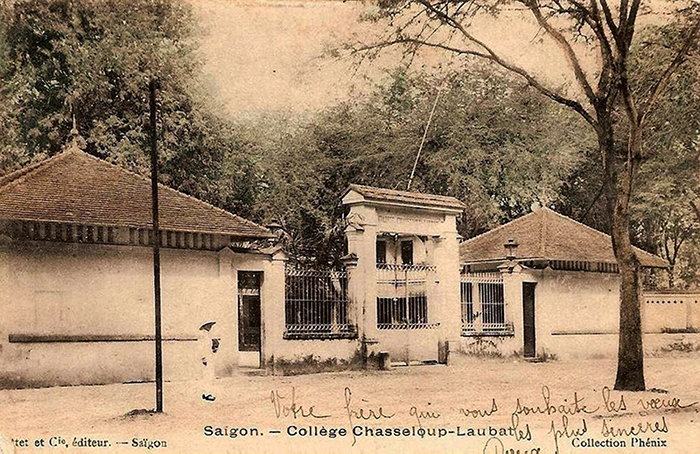(edit 22nd August 2018 – readers may also be interested in the careers of Ana Olgica and Enno Aare)
The works of the Vietnam-born French composer and pianist Amity Cadet have all but vanished from public consciousness. Of her innovative and eclectic body of work from the mid 1970s to the early 1980s, only one song – “Romances” has made it into the era of YouTube:
and Spotify:
This Is : Amity Cadet https://t.co/7jY7wSFMGb #NowPlaying
— Séamus Mac Suibhne (@JamesMcQueen78) February 6, 2018
https://platform.twitter.com/widgets.js
Cadet was born in Saigon on the 7th of May 1954 – symbolically the day of the fall of Dien Bien Phu which would mark the end of the French presence in Indochina. Cadet’s father was a railway engineer working on the maintenance of the North-South Railway Line, her mother a teacher in the Lycée Chasseloup-Laubat:

Amity Cadet’s destiny was to move from lost world to lost world; it is not clear when exactly the Cadets left Vietnam, but they next were in Algeria, just in time for the escalation in the Algerian War of Independence that followed the Philippeville Massacre. They stayed in Algeria somewhat longer, until the mid-1960s. After all the Cadets were not pieds-noirs, and it seems that Mr Cadet secured employment with the post-Independence. In 1964 the Cadets relocated to Quebec City. At that point, Quebec remained a highly traditionalist, Catholic province. This suited Mrs Cadet, who at this point had become intensely devoted to the Most Immaculate Heart of Mary, but in the familiar pattern Quebec too was about the change, if not as violently as Vietnam or Algeria just as decisively.
Cadet’s teens spanned the years 1967 to 1974, but contemporaries did not recall her seeming terribly affected by the supposedly epoch-making events of the time. “She was a calm, placid girl. She liked slightly cheesy music – Neil Diamond, John Denver, that kind of thing.” She had begun learning the piano in Algeria, and kept up her lessons with Madame Press, a legendary Quebec City music teacher of fearsome repute. Yet, uniquely among Press’ students, Cadet had a calming effect on the irascible, ancient woman who had been been brought to Canada by her parents fleeing an Odessa pogrom in the year 1881. “Things that, from anyone else, would bring forth a hail of Yiddish curses and blows from tiny fists, would be greeted with a benevolent smile if Amity did them,” recalled a contemporary from the Quebec City Conservatory.
It was in 1975, aged 21, that Amity Cadet began to release albums on the legendary Montreal label Les Enfants d’Esprit. The pioneering dronerock act Nul and the “extreme singer songwriter” Benoit de Boniface (whose ninety five minute strums on open chords had so divided opinion during the first Festival De La Sagesse held in 1972) were the best-known acts on this label. The Les Enfants d’Esprit archives, including the cover art for all records released on the label, were destroyed in a fire in 1983.
All known copies of Amity Cadet’s debut, Piano de l’Enfer were destroyed in the flames. Perhaps, somewhere in a mouldering jumble sale or in an attic, there remains a copy of this album described by Canadian music critic Doug Bundle as “at the same time terrifying and arousing, like the lovechild of Charles Manson and Richard Nixon” (to which Amity Cadet reportedly replied “What does that even mean?)
Whatever the merits of Bundle’s clotted prose, Amity Cadet’s debut was a milestone in the development of minimalist music. One contemporary said that the best way to imagine it is “Ligeti’s Musica Ricercerta II – played in hell by a pianist being slowly disembowelled by the lovechild of Charles Manson and Richard Nixo.n”
The years went on – Charles Manson and Richard Nixon became somewhat lesser cultural touchstones – and as the 1970s became dominated by punk (according to ageing music critics) and the Bay City Rollers (in reality), Amity Cadet found herself swimming against a musical tide of triviality, swimming against a cultural tide of cynical materialism, and swimming against a personal tide of repeated bad relationships. In 1979 a nightmare date with Donald Sutherland, followed by a nightmare date the following Saturday with Leonard Cohen, was immortalised in her minimalist piece “Threnody On Nightmare Dates with Donald Sutherland and Leonard Cohen on Two Successive Saturdays” She persuaded Les Enfants D’Esprit to release this fifteen hour work in a twenty-LP set, no small vote of confidence in a work that consisted of Cadet repeatedly pressing all 88 piano keys at the same time using a length of wood.
The album “Romances” appeared in 1981. It is from this that the one surviving Amity Cadet track that appears on Spotify and Youtube comes from. Along with Tubular Bells, it is regarded as the high water mark of New Age music. “Romances”, the song, is the paradigmatic piano relaxation song, one whose structure however contains hidden repetitions of note sequences that encode the opening verses of the Books of Revelations.

Later in the 1980s, Amity Cadet renounced music. The death of her mother in a train crash, for which her father, who had been unaware his wife was on the train, was later held criminally negligent for, deeply affected her. She used what royalties she had gained to buy up her records and destroy them, and to pulp entire runs of magazines that mentioned her career. She, like her mother before her, was to devote her life to the Immaculate Heart of Mary, and music played by the lovechild of Charles Manson and Richard Nixon in hell did not quite fit this aspiration. Some tender impulse, however, led her to spare “Romances” from the memory hole, and to this day we can enjoy this epitome of piano relaxation.
success for the next article. thanks.
LikeLike